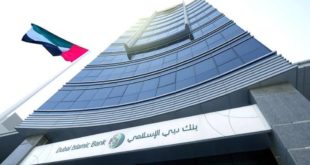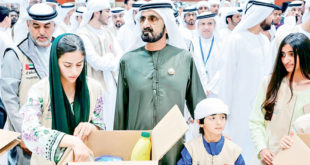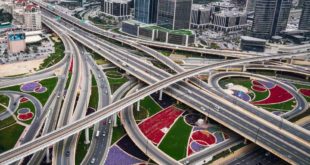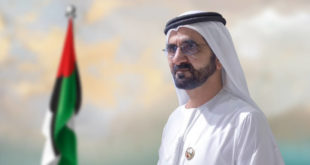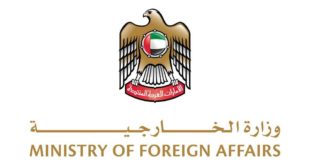Media In Abu Dhabi – 12 December 2018 / WAM /
The Ministry of Economy issued today the annual achievements report 2018, which reviews its achievements throughout the world, where the country’s GDP at current prices for 2017, according to official data issued by the Federal Authority for Competitiveness and Statistics – about 1405 billion dirhams, achieving growth of about 7.2% 2016, while non-oil GDP at current prices for 2017 reached about 1092 billion dirhams, with growth rate of 3.2% over 2016, which makes the contribution of non-oil sectors in the GDP of the state achieved a rate of 77.7% according to the current price index.
The real GDP of 2017 at constant prices – on the basis of 2010 as the base year – was worth more than 1422 billion dirhams, with a growth rate of 0.8% over 2016, while the value of real non-oil GDP for the same year about one trillion dirhams, Growth of 2.5% over 2016, thus contributing to 70.5% of non-oil sectors in real GDP, which shows a positive trend in the promotion of the policy of economic diversification adopted by the State.
Minister of Economy, Sultan bin Saeed Al Mansouri, said that the UAE has strengthened its regional and international standing in economic terms thanks to the continued balanced and positive performance of the country’s economy and the result of continuous national efforts to enhance the resilience of the national economy and its ability to meet regional and global challenges and changes. Developing the potential for growth and building the economy of the future, foremost of which is to diversify the economic base and stimulate the trend toward sustainability.
“The policies and economic plans adopted by the country are based on well-considered and best-practices standards through an accurate analysis of the economic situation and prospects for the future at the state, regional and global levels, with the principle of sustainable growth as the cornerstone for building the future economy. The economic determinants of the 2021 vision of developing a diversified global competitive economy based on knowledge and innovation led by national competencies, which is clearly reflected in the continuous developments of the State in vital areas such as trade, Communications, information technology, tourism, infrastructure, education, health care, etc. ”
Al Mansouri explained that the UAE continues its development path in line with future visions and strategies that are integrated and constantly evolving. The most prominent of these are the National Agenda 2021, the UAE 2071, the post-oil economy plan, the consolidation of economic diversification and well-considered national strategies in the fields of innovation, Industrial IV, artificial intelligence, space programs, energy, renewable energy, green economy.
He pointed out that the umbrella of non-oil sectors, which have witnessed significant progress and significant achievements over the past years, continued their support and growth during 2018 as one of the pillars of the developmental process of building the post-oil economy. The infrastructure is large and diverse, Including the integration of banks into the formation of giant global financial entities, the renewable, clean and nuclear energy sector, foreign trade and wholesale and retail trade, including e-commerce, small and medium-sized enterprises and enterprises Including the development of support systems, finance and training, the ICT sector, and manufacturing industries such as petrochemicals, building materials, metalworking, food and pharmaceutical industries, and tourism, including the development of facilities, resorts and strategic tourism projects.
The UAE has been in the top position on the regional and Arab levels and in the world ranking in several economic indicators, most notably the world ranking 11 in the World Bank’s Ease of Doing Business 2019 Index and the 23rd in the Trade Empowerment Index 2016 of the Economic Forum The world’s 27th in the World Economic Forum’s Global Competitiveness Index 2018-2019 and the 7th in the GESI 2017 Global Entrepreneurship Index (GEMI) and the 38th in the Global Innovation Index 2018 (INSEAD) Cornell University and the World Intellectual Property Organization.
The Minister of Economy Sultan bin Saeed Al Mansouri said that 2018 witnessed a pivotal station in the efforts to develop the investment environment in the country, improve its attractiveness to foreign capital and attract qualitative investments through the issuance of Federal Law No. 19 of 2018 on foreign direct investment, Enhancing the incentives and advantages offered by the State to the foreign investor and developing a safe and attractive investment environment, the most important of which is the possibility of 100% ownership in specific sectors, investment protection guarantees, financial transfer facilities and the possibility of amending the partnership, The transfer of ownership in accordance with the interest of the investor, according to a set of controls and standards that correspond to the determinants of sustainable development in the state and the interests of all parties.
He pointed out that increasing the country’s attractiveness to foreign direct investment is a strategic objective within the framework of the National Agenda 2021, as it is one of the main possibilities of economic growth. The new law will play a prominent role in the localization of knowledge and the transfer of technology.
 Media ININ Economy We Trust
Media ININ Economy We Trust


